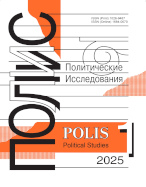Leaders of states after passing the top of their political career:
factors, determining roles, and professional trajectories
Samarkina I.V.,
Dr. Sci. (Polit. Sci.), Associate Professor, Head of the Department of Political Science and Political Management, Kuban State University, Krasnodar, Russia, smrkn@mail.ru
elibrary_id: 186730 | ORCID: 0000-0002-0205-8543 | RESEARCHER_ID: A-4728-2017
Dmitruk S.D., dmitruksergey@mail.ru
Samarkina I.V., Dmitruk S.D. Leaders of states after passing the top of their political career: factors, determining roles, and professional trajectories. – Polis. Political Studies. 2011. No. 1
The authors concern themselves with the phenomenon of ex-leadership. Types of career trajectories are described in the article. Projection of those trajectories into the socio-political sphere has enabled the authors to characterize the main roles of “former” heads of states in the political system and the factors that influence them. Results of the analysis of this problem, with the material of the CIS countries taken as the object analyzed, are presented.
See also:
Tev D.B.,
Federal administrative elite of Russia: features of a career after leaving office. – Polis. Political Studies. 2023. No1
Pishchulin N.P.,
Political Leadership and the Electoral Process. – Polis. Political Studies. 1998. No5
Shestopal Ye.B.,
Introducing the section. The human dimension of politics. – Polis. Political Studies. 2013. No6
Round Table of the «Polis» Journal, Shestopal Ye.B., Winter D., Irkhin Yu.V., Chirikova A.Ye., , , , Kuznetzov I.I., Rogozar-Kolpakova I.I., Streletz I.E., Dobrynina Ye.P., , Trofimova V.V., Pishcheva T.N.,
Political leadership and personality problems. – Polis. Political Studies. 2011. No2
Zorin V.A.,
Models of Russian presidents political leadership. – Polis. Political Studies. 2010. No4





.jpg)






 print
print
.jpg)
.jpg)